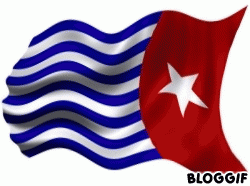 The
opening of the Oxford headquarters of Indonesian separatist group Free
West Papua has caused a rift between leading British diplomats and the
Indonesian government.
The
opening of the Oxford headquarters of Indonesian separatist group Free
West Papua has caused a rift between leading British diplomats and the
Indonesian government.Launched in 2004, the Free West Papua Campaign seeks independence from Indonesia for the indigenous people of West Papua. On its website the organisation describes itself as “a peaceful, public campaign, whose aim is very simple: to give the people of West Papua the freedom to choose their own destiny”.
Foreign Minister Marty Natalegawa summoned British Ambassador Mark Canning to question him over the rise of the separatist group. In a statement issued prior to the meeting, Natalegawa argued that the opening of the office was “clearly incompatible and contrary to the friendly relations that have existed between the two countries”.
Canning said after the meeting: “The Minister conveyed to me in clear terms the strong concern of the Indonesian Government”.
However he emphasised that the British Government could not take responsibility for the opening of the headquarters, since “such an office does not require our permission to open, and does not therefore reflect the British Government’s views.”
He however assured the Foreign Minister: “we recognise the sensitivity of this issue for Indonesia” and “respect the territorial integrity of Indonesia and do not support calls for Papuan independence”.
The ambassador added that Britain supports Indonesian efforts “to address the problems of Papua and hopes to see it enjoy the same level of peace, stability and prosperity as the other parts of this nation.”
Mike Atkins, a volunteer with the Free West Papua Campaign, finds it “frustrating to see that the UK Government maintains this line.” He sees a “stark contrast between the democracy Indonesia claims to be and its attitude towards basic rights such as freedom of speech that it displays here”.
He added: “Our goal is to build up public pressure to make the UK Government recognise the illegitimacy of Indonesian rule over West Papua and the human rights issues there, so that it will change its foreign policy”.
Atkins remains positive about the campaign, commenting: “Support for our cause is growing rapidly all around the world.”
West Papua, the western part of the island of New Guinea, was a Dutch colony until it was handed over to temporary UN administration in 1962. It became part of Indonesia in 1969 after the Act of Free Choice, a referendum on the inclusion of West Papua. Independence activists question the legitimacy of this election, arguing that only an unrepresentative number of about 1000 people were selected to vote and were put under pressure to decide in favour of West Papua’s inclusion.







No comments:
Post a Comment